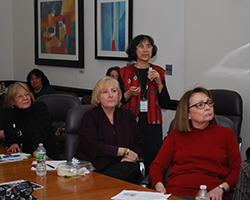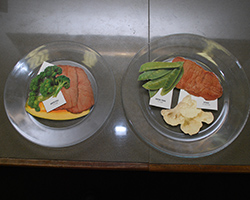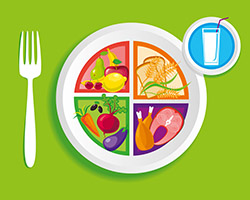

Nutrition Ed
Promoting Good Nutrition at Einstein
It is now widely accepted that nutrition is essential to maintaining good health. Although previously not part of traditional medical education, during the past five years, an elective, “Nutrition and Health: Patients and Populations,” has become an increasingly popular course among first-year medical students at Einstein.

Dr. Yasmin Mossavar-Rahmani discusses serving portions during a session of the Brown Bag Lunch Series on nutrition, offered to Einstein employees“Students are very interested in nutrition these days compared to 20 years ago,” said Dr. Yasmin Mossavar-Rahmani, associate professor of clinical epidemiology and population health. The course, along with an elective on health disparities, is an outgrowth of the medical school’s Clinical Prevention & Population Health Task Force. Dr. Mossavar-Rahmani led the development of the course, using input from students and Einstein physicians, including Drs. Janice Barnhart, Nichola Davis, Ben Kligler, Julie Ramos and Marina Reznik.
There’s a movement now to get more nutrition into medical schools and to get students to focus on its role in prevention.” The course’s six sessions examine dieting myths; nutrition facts labels (both in English and Spanish); the U.S. Department of Agriculture (USDA) dietary recommendations; nutrition assessment; motivational interviewing and “hot topics” in nutrition, based on student suggestions.
A recent class focused on the origins of the USDA guidelines for public health, and included discussion of how a healthy diet can prevent heart disease, diabetes, and possibly stroke. Students also learned about using biomarkers, such as breath or urine, to get a more definitive indication of a patient’s diet than can be obtained from an interview or questionnaire. The course also includes role-playing through which students take turns portraying the patient and the physician.
“Students work with individuals from the Bronx community who volunteer to participate in an interview session,” said Dr. Mossavar-Rahmani. “They like this exercise, in particular, because it allows them to convey information from nutrition facts labels and to check back with their participant to elicit what was understood.”

Plate sizes have increased over the past few decades, illustrated by these two plates from the same manufacturer purchased 25 years apartDr. Mossavar-Rahmani explained further, “The motivational interviewing session focuses on improving listening skills and strategies for increasing patient engagement, such as making eye contact. The ultimate aim is to help students understand the patient while empowering him or her to make dietary changes that can improve health. In this way, students learn how to motivate patients to adopt healthier eating habits.”
While educating future physicians about the role nutrition will play in their care of patients is important, students are not the only members of the Einstein community who benefit from enhanced knowledge about this subject. Earlier this year, the College of Medicine initiated a Brown Bag Lunch Series designed to educate employees about various health topics. The series launched in March, with the first of three sessions on nutrition. (The second session took place in April, and the final session was held on May 29.)
“We thought it would be beneficial to offer employees a series of talks on different health issues that affect us all,” said Tina Crane, manager of occupational health services.
“Judging by turnout for these sessions, staff and faculty have been very receptive to attending the Brown Bag offerings,” added Ms. Crane, who conceived of the series with Barbara Levy, assistant dean, and Dr. Edward R. Burns, executive dean.
And the information garnered has proved helpful. “A few of my co-workers have been on an exercise-and-eat-healthy kick,” said Nate Battle, a network services specialist in information technology services, who attended the April session. “They suggested I come, and I learned that the cheese I sometimes eat to stave off hunger contains more fat and sodium than I realized. I know I can still eat it, but plan to cut down.”

The new USDA recommendations for daily servings are illustrated with My Plate, which replaced the more confusing food pyramid that had been used for decadesWhether developing curriculum for students or helpful information for public consumption, the important thing is to separate fact from fiction, and to help make sense of everything, noted Dr. Wylie-Rosett, professor of epidemiology and population health and division head of health promotion and nutrition research, as well as the Atran Foundation Chair in Social Medicine. “There can be lots of often conflicting information to sort through and digest. When we work with students, we try to get them to understand the patient’s perspective. And for the employee sessions, we want to provide those who attend the tools to assess the information they are getting.”
She continued, “The press loves articles like ‘The Five Super Foods,’ which boil everything down to a simple message. But there are better ways of giving more accurate information.”
These include having course or series participants break into groups to brainstorm ideas about healthy eating, distributing tip sheets from the USDA and other reputable sources, and providing information about alternatives to supermarkets and fast food chains for getting one’s food. During the brown bag session, Dr. Wylie-Rosett referenced the community-supported agriculture group started by Einstein students last year, through which nearly 100 members of the Einstein community purchase shares to receive organic produce provided by a local farmer.
“The key is making people—students and employees—savvier about the health and nutrition information they read,” agreed Dr. Mossavar-Rahmani.
“Being more informed about what you put on your plate can make a difference.”
Planning for the next Brown Bag Lunch series, which will be offered during the fall, is underway. “In planning our next offering, we’re seeking input from employees about which health issues they want to know more about,” said Ms. Crane. To suggest possible topics, please e-mail: occupational-health@einstein.yu.edu.
Posted on: Friday, July 5, 2013

Tablet Blog